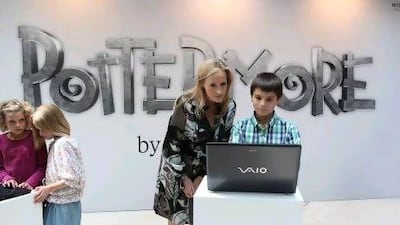The bedtime story is one of the most enduring and special scenes of childhood. With lights dimmed, doting parents reach for the bookshelves and pick out much-loved, dog-eared classics such as Hans Christian Andersen's Fairy Tales, Rudyard Kipling's The Jungle Book or LM Montgomery's Anne of Green Gables to read to their youngsters.
And yet it may not be long before this scene seems as quaint and old fashioned as playing hopscotch or listening to vinyl records. Because by the time Puffin, the largest publisher of children's books in much of the English-speaking world, celebrates the 30th anniversary of its Classics collection later this year, they will all be available to read on digital reading devices. Meanwhile, all seven books in JK Rowling's Harry Potter series were, late last month, finally published as downloads – to some fanfare. The bedtime stories of the future will be read, it seems, via the light of a glowing iPad.
Still, Amanda Punter, the editorial director for Puffin Fiction, thinks such a state of affairs is nothing to be scared of – even when it's suggested that waving a big chrome tablet in front of a child's face might be killing the magic somewhat.
"I genuinely believe there is a place for both digital and physical books," she says.
"But if you watch children with iPads, the magic is definitely still there. The child is still being transported by the story, still totally absorbed by the experience. To me, it feels that as long as they're discovering the pleasure of reading and enjoying the story, the method of delivery actually becomes irrelevant."
In fact, it would be rather remiss of Puffin not to react to children's changing habits. Punter says that the older age groups especially are increasingly knowledgeable about the various digital devices available – and when a book is published in, for example, Simon Scarrow's Gladiator series, Puffin is not necessarily competing with other children's novels in the marketplace, but other video games.
So, it's not so much the digital versions of the Puffin Classics that suggest what the future might look like for children's publishing. In the end, they're just literal digital copies of the original physical book. It's the work that has been done with, for example, Beatrix Potter's enduring children's classic The Tale Of Peter Rabbit. Embedded within the e-book is full animation, original audio, games and activities.
"Particularly at the younger end of the scale, there are some hugely exciting things that can be done to make the whole experience more interactive," says Punter.
"The Peppa Pig books, for example, already lend themselves to touching and feeling in the print format so it seems natural to do similarly exciting things digitally."
A three-year-old with an iPad, however, does seem a recipe for disaster.
"Have you ever seen a young child with one, though?" laughs Punter. "It's incredible. They intuitively know how to engage with it. And for those who find that completely horrific, I'm sure many parents are more than familiar with their young child's mobile phone obsession. Arguably, if you could get them to read on it, that's a better use of their time than deleting your photos or playing Angry Birds."
At which point many parents would no doubt say "if only it were that simple". But it is true that the children's entertainment landscape has changed hugely in the past few years. A fan of Jeff Kinney's hugely popular Wimpy Kid series will not only read the books, but visit the website and watch the movies. "They don't mind what format it's in," says Punter, "they just want to experience and immerse themselves in that world as frequently as possible. Our job is to make sure we make that happen in a way that is true to the original vision."
Naturally, of course, there will be naysayers who still can't imagine anything other than digging out that well-thumbed copy of Treasure Island for their children. How would Punter reassure them?
"Well, first of all, making sure the child enjoys the book, however it's presented to them, is at the heart of everything we do. But we have to be responsive to changes in children's behaviour. And from our experience they are using these devices. I would say it should actually be of some comfort to parents that such big changes to publishing are being made, specifically so children can still discover the pleasure of reading."

